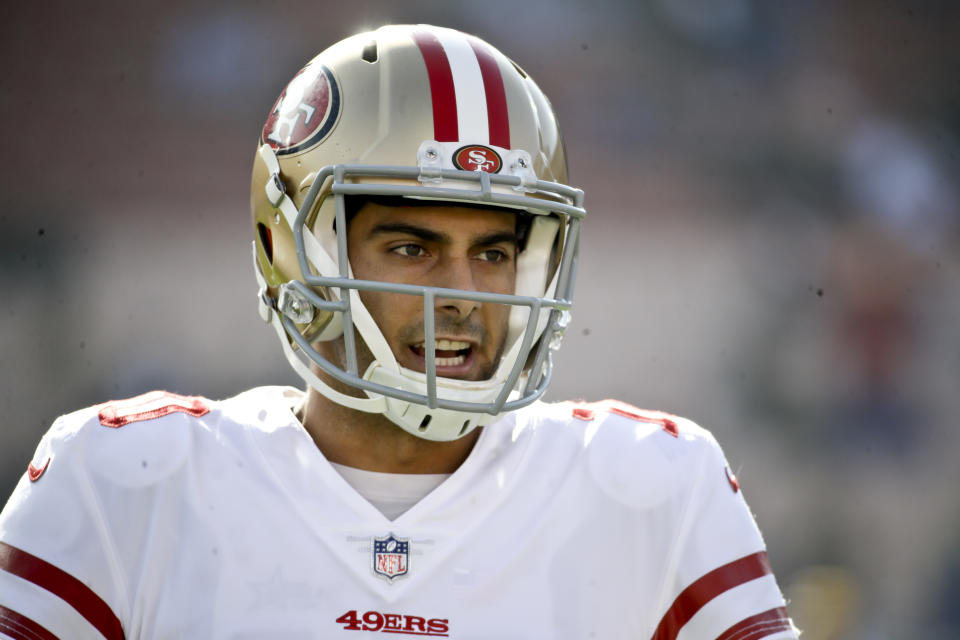After Jimmy Garoppolo's deal, is it smart for teams to still be overpaying QBs?
On Thursday the San Francisco 49ers signed quarterback Jimmy Garoppolo, with his seven career starts, to a record five-year, $137.5 million deal. That’s $27.5 million per year.
The Eagles signed nine free agents last year from other teams who stuck on the roster and all of them contributed to a Super Bowl win: receiver Torrey Smith, quarterback Nick Foles, receiver Alshon Jeffery, offensive lineman Stefan Wisniewski, defensive end Chris Long, safety Corey Graham, guard Chance Warmack, running back LeGarrette Blount and cornerback Patrick Robinson. Total cost, based on per-year averages in those nine deals? $30.1 million.
Not everyone can hit as many home runs as the Eagles did in free agency last offseason. And the 49ers weren’t going to let Garoppolo go. Quarterback still is the most important position, and always will be. Just wait until the Eagles have to pay Carson Wentz. They’ll pay because they have to.
But we’ve reached a point in which the quarterback market is entirely out of whack with the rest of the rosters. Teams are probably better off not paying exorbitant prices for quarterbacks like Garoppolo or 2018 free agents Kirk Cousins and Case Keenum. The top 16 contracts in the NFL on the books already for 2018, on a per-year average, are quarterbacks. Alex Smith, Joe Flacco and Ryan Tannehill make more per year than any non-quarterback in the NFL. Nobody would pick Tannehill over Aaron Donald or Von Miller, yet he’s paid that way.
Most of the quarterback madness doesn’t make logical sense, but teams can’t help themselves. No team wants to be the one to draw the line in the sand and let their good quarterback go once he’s ready to cash in big. The only reason Cousins is available is because the Redskins tried stringing him along on franchise deals and handed him leverage. Then seeing Cousins was on his way out, Washington traded a ton for Smith and then gave him a four-year, $94 million deal.
It’s a never-ending conundrum. Quarterback is the most important position, and the market is set well above where it probably should be for them. The Detroit Lions paid Matthew Stafford $27 million and the Oakland Raiders paid Derek Carr $25 million because that’s the price tag. If they didn’t pay them like that, someone else would. But think of it this way: Stafford and Carr make more than two Luke Kuechlys (Kuechly per year: $12.4 million). Teams fear losing good quarterbacks, so they pay them like great quarterbacks, even if they know that makes their path to a championship much, much tougher in a salary-cap league.
Certified agent and OverTheCap.com writer Zack Moore’s research showed that of all Super Bowl champions since 1994, the highest percentage of cap space taken up by the quarterback was Peyton Manning’s 12.21 percent in 2015. Most championship quarterbacks are below 10 percent.
Some NFL writers seem to think you need to pay a QB no matter who he is if he's your QB. This is a false narrative.
If you overspend at QB, you can't use that cap space on others who elevate your roster. Here are the QB cap hits for champs prior to 2017 from Caponomics: pic.twitter.com/KdpGz0Nh0S
— Zack Moore (@ZackMooreNFL) February 8, 2018
Wentz and Foles combined accounted for about 4.5 percent of the Eagles cap.
If the NFL salary cap is between $175-180 million per team this season (it was $167 million last season) then Garoppolo’s first-year cap hit of $37 million is more than 20 percent of the 49ers cap. It’s historically unprecedented in the salary-cap era to build a championship team with a quarterback taking up anywhere near that much of the cap. The 49ers smartly front-loaded the deal, but cap numbers of $26.6 million, $26.9 million and $27 million the final three years of the deal are still harsh. The 49ers had a ton of cap space, so it made more sense for them. Teams that aren’t flush with cap space still have to pay huge prices for any moderately good quarterback. Whoever signs Cousins or Keenum (unless it’s the Browns, who have more than $100 million in cap space) will be practically mortgaging their cap for one player.
But it goes back to the quarterback conundrum. If you don’t have a good quarterback you chase one constantly. The Denver Broncos went from a Super Bowl champion in 2015 to a 14-18 team that missed the playoffs two seasons in a row due in large part to their mess of a quarterback situation. They’re expected to be in on the Cousins sweepstakes. The Broncos need a better quarterback. Paying for the best quarterback on the market probably means Denver can’t build a championship team around him. Round and round we go.
“This position is key,” 49ers general manager John Lynch said in the press conference to announce Garoppolo’s deal. “If you don’t have one, you’re looking for one.”
It’s not impossible to win with a high-priced quarterback (the Eagles proved it’s not impossible to win with a bargain quarterback either). The 2016 Atlanta Falcons came as close as you can to a title without actually winning it, and they didn’t lose Super Bowl LI in overtime because Matt Ryan took up 15.4 percent of their cap. But paying more than 10 percent of your cap to a quarterback makes it harder. The Seattle Seahawks won big when Russell Wilson was on his rookie deal, and now their depth is diminished after Wilson’s mega-deal and they aren’t the same team. Wilson getting paid and the Seahawks’ gentle decline seem to be directly correlated. Yet, it’s impossible to believe the Seahawks would be better off without Wilson, and nobody suggested they not sign him to an extension. It’s an impossible puzzle to solve.
Nobody is saying the 49ers screwed up signing Garoppolo. They had to sign him, for many good reasons. He looks like the real deal, and they weren’t going to let him go after trading for him and watching him play well. The 49ers were also in an advantageous position of having way more cap space than anyone but the Browns. Not all teams are in that spot. They just spend big on quarterback, even though they know that contract will likely will become the biggest obstacle to the ultimate goal of a Super Bowl.

– – – – – – –
Frank Schwab is a writer for Yahoo Sports. Have a tip? Email him at shutdown.corner@yahoo.com or follow him on Twitter!
Follow @YahooSchwab



